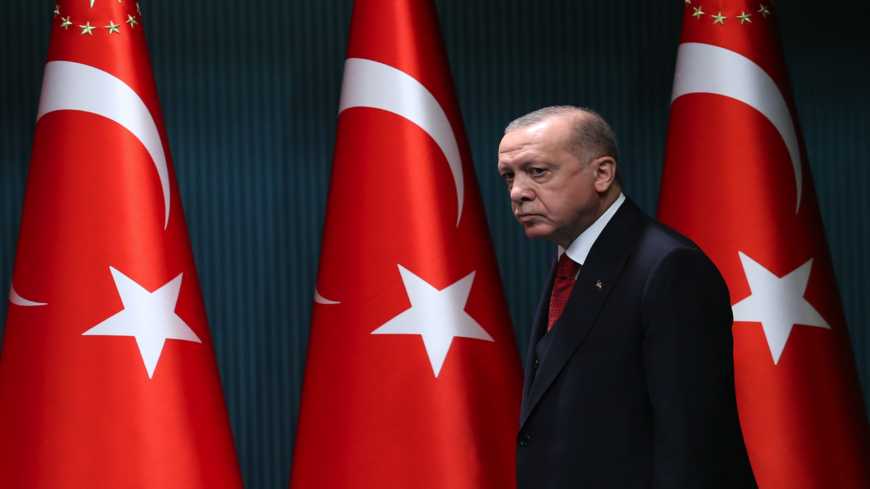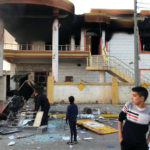Over the last couple of months, the world has observed a relatively surprising picture: a kind and gentle Recep Tayyip Erdogan. He is ready to embrace Israel, declare the future of Turkey in the European Union (EU), talk to the Saudi king on the phone and cheer for the end of the blockade against Qatar, even biting his tongue against his favorite enemy, Syrian President Bashar al Assad. In preparation for the new US administration, Erdogan is trying to play nice with all around him.
In the meantime, he is also visiting senior officials from smaller opposition parties to expand the coalition for the 2023 election. Although opposition strongly argues an early election is inevitable, the Justice and Development Party (AKP) so far has insisted elections for the presidency and the parliament will be held in 2023 as scheduled.
Erdogan, meanwhile, is not hiding his willingness to expand the election coalition. To get 51% of votes in the new system his own administration designed, he is obliged to seek new political allies however insignificant their vote share might be. Erdogan and his allies are also contemplating altering the current electoral rules to continue their incumbency.
Erdogan has again started calling multiple groups “terrorists” in the meantime, just like he had done before municipal elections in March 2019 and national elections in June 2018. On the target this time around are the second and third largest political parties and their members, the Republican People’s Party (CHP) and the pro-Kurdish Peoples’ Democratic Party (HDP), respectively.
Kemal Kilicdaroglu, chairman of the CHP, referred to Erdogan as a “so-called president” in one of his speeches. His goal was to highlight that against the oath Erdogan took as Turkish president, he also still maintains the AKP chairman position. Erdogan got angry about the phrase “so-called.” For weeks, he and his deputies criticized Kilicdaroglu for disrespecting the nation’s will. Finally, Erdogan’s attorneys filed a lawsuit against Kilicdaroglu for 1 million liras in damages.
During the protests at Bogazici University, the CHP’s Istanbul chair, Canan Kaftancioglu, was present to support the students. Erdogan was furious about that and claimed that she belongs to terrorist groups. He also branded the protestors at the college as “not students but terrorists.”
Erdogan’s fury is not just limited to declaring the opposition as terrorists, though. He also referred to headscarf-wearing members of the CHP as “window dressing,” indicating once more that pious Turks should not belong to left-leaning political parties.
Erdogan repeated his reference to jailed HDP chairman Selahattin Demirtas as a terrorist after the European Court of Human Rights ruled that Demirtas should be released immediately. These allegations are not just words; there was a flurry of probes in December and more in January against the HDP deputies. Today, all HDP members are being probed. The next step is to remove the immunity of a lawmaker, paving the way to prosecution and then, most likely, imprisonment.
Why is Erdogan incensed against so many groups in Turkey?
Baskin Oran, professor emeritus of international relations at Ankara University, told Al-Monitor, “Of course, AKP and MHP worry they will miss this historic opportunity to realize their counter-revolution. Erdogan is angry in part because it is his nature, in part because he needs to show that determination to keep his supporters.”
Based on my discussions with Oran and other scholars, there are three main reasons behind Erdogan’s gradually brewing anger.
Erdogan won the presidency in 2018 with a coalition of ultranationalists and other small right-wing parties’ support. Since then, his popularity has gradually declined. Director of Eurasia Public Opinion Research Center Kemal Ozkiraz published his agency’s first 2021 findings on Jan 14. Ozkiraz’s detailed report, in line with others, highlights that although Erdogan is in the lead against political party leaders, there are two mayors who have been taking the lead from Erdogan. One is Ankara Mayor Mansur Yavas; the other is Istanbul Mayor Ekrem Imamoglu.
AKP officials have struggled to contain the opposition mayors’ successful projects and curtail their legal powers. Sometimes their efforts are futile. For example, when Imamoglu secured a second grant from the US Trade and Development Agency (USTDA) to minimize Istanbul’s traffic congestion, the pro-government press presented the deal as “Istanbul’s data is sold to the USA for a second time.” What the news diligently ignored was the fact that Gaziantep Municipality, whose mayor is Fatma Sahin, a well-known AKP politician, received a similar grant from the USTDA before Imamoglu and Sahin’s deal was celebrated as a victory.
The growing popularity of two mayors is a crucial concern for Erdogan. Despite all the gaslighting and smearing campaigns, these two mayors serve over 21 million people combined (1/4 of the Turkish population) and provide solutions to people in need. For example, Imamoglu’s struggle to rent more stores to sell subsidized bread for months has been blocked by the government. Then Imamoglu decided to employ food trucks to distribute the bread in most needy neighborhoods. The city-subsidized bread is half the cost of regular bread.
Growing economic despair is the second reason why Erdogan is so angry. While megaprojects and lavish government spending such as new palaces continue, unemployment and poverty are skyrocketing in Turkey. About 60% of those employed earn minimum wage or below, and 36% of the population is below the hunger threshold.
The minimum wage is about $380 a month. Although the government increased the minimum wage in December, opposition mayors have managed to set the minimum wage for their workers higher. In Konya province, known as the heart of pious Muslims, there is only one CHP municipality and the wages of all workers were increased more than to $600 a month. The AKP’s quixotic battle to contain opposition mayors sometimes generates unintended consequences. For example, in the province of Bolu, the CHP municipality’s attempt to build a mosque was vetoed by the AKP. The constituents become collateral damage as the priority of AKP members seems to be discrediting opposition mayors rather than serving the public.
The last reason for Erdogan’s anger is the dwindling public trust in the AKP’s competency and the government’s desperation against growing leaderless resistance. In the last year, every step of pandemic management has become a fiasco from face mask delivery to vaccine quality and stocks.
The attempt to control every social media post without shutting down the services is an uphill battle for Ankara. Erdogan’s angry outbursts are the only shield left to keep the pretense of well-functioning, competent governance.
The more power Erdogan has grabbed over the media, judiciary and legislature, the worse the quality of life has become for people in Turkey. The promised benefits of the presidential system have not trickled down to the general population. If the AKP’s strategy was to disrupt, discredit and divide, it may fail this time as target populations are simply too exhausted and hungry.
By: Pinar Tremblay
Source: Al – Monitor



